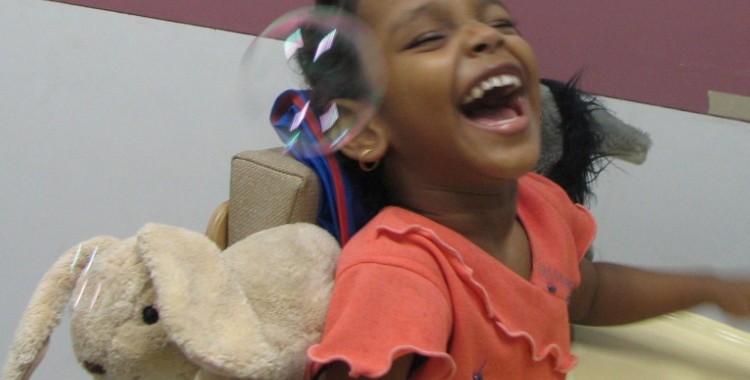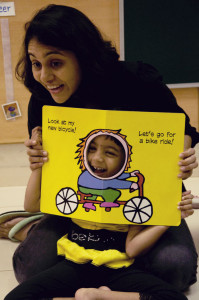
The three days I spent at Ummeed opened my eyes – really wide, might I add – to the world of special care. From the minute I entered their simple and cheerful Chinchpokli office, I could not help but notice how professionalism and care define everything that they do. Beginning from the name tag I was given that indicated I was a visitor to their 60+ staff members, who went out of their way to help when I seemed lost. To the form I signed giving my consent to abide by visitor rules ( such as no photography) – what a nice way to get the message about acceptable behavior around special children across! I had framed the right questions in my head over the weekend but was yet hesitant to ask – so I really appreciated having this message come across in this polite and direct manner.
But the professionalism and care that they show towards the children they serve – the reason they were set up – is what I loved the most. Special children are at the center of everything they do and more importantly, how they do it.
At a distance, Ummeed may seem no different to the other non-profit organisations out there that help children with developmental disabilities or those at high risk of disabilities. Take a closer look and you will realise that they stand out in more ways than one. Such as their emphasis on empowering parents, allowing them to take a lead role in providing care for their child, which is a unique facet of their model. They believe (and rightly so) that professionals are only part of the story and that families/parents play a highly-influencing role in their child’s development. This is also the reason why therapists come out to their office reception area and escort both children and their parents into the therapy room. A small gesture but it says so much!
Their therapy rooms have air-conditioners instead of fans – making you wonder why they do not cut costs by eliminating the former. However, this is a deliberate decision – from a security point of view to not wanting to distract the children during their sessions, thus avoiding loss of momentum/value gained out of the session. It also helps to keep stuffiness at bay within the cubicles ( the cubicle-setup, by the way, is another deliberate move that ensures that a child in one session does not disturb another). Besides, special children are usually more sensitive to their surroundings, which includes the draft of the fan too.
Another thing I noticed was the lack of soft toys. Their rooms are filled only with educational toys or those with bright lights/sounds that can be used to attract childrens’ attention. It turns out that soft-toys are intentionally avoided as they attract dust, which may make the children more prone to infections. Further, toys are bought from reputed stores/brands only (like Hamleys and Fischer Price) to ensure that no fake Chinese remakes or those containing lead, which may be harmful for the children, are bought.
These facilities are made available to all alike – it does not matter if the child is from an affluent or a not-so-affluent background. Ummeed’s policy of providing care to all, irrespective of financial considerations, makes them serve all families who approach them – never turning away a child because of an inability to pay. No distinction is made when conducting the therapy sessions either. Infact, the quality of their therapies is nothing short of what a private doctor/hospital would provide. Challenging the standards one tends to equate with a nonprofit, their therapy sessions are detailed and intense; conducted by therapists with specialised degrees, many from reputed colleges abroad.

Working with special children is not as easy as Ummeed makes it out to be. 12 years of expertise and managing many-a-difficult cases during this tenure is what makes them a leader in this space today. Also well-thought of innovations, such as the introduction of social support, along the way, is what makes their care better as well as sets it apart. The social support team steps in and works with only those families not attending therapies regularly or where recommended care is not being given to the children at their homes too. From emotional support to being an ear to mothers who want to speak to somebody who would empathise with their difficulties, to convincing stubborn husbands and in-laws on the need for special care for their children – the kind of social support they provide is varied. However, it is a big step on the part of Ummeed to ensure that children are truly benefitting from the care being provided.
Many other gestures, like SMSes to parents before every session to remind/confirm the session, speaks volumes about the way Ummeed works. Even the sessions I observed were only those where parents’ consent had been taken for the same.
This is clearly an organisation that has spent time thinking about the true purpose of their existence; and are working towards getting there in a comprehensive manner.
Established in 2000, Give is the largest and most trusted giving platform in India. Our community of 2.6M+ donors have supported 2,800+ nonprofits, impacting 15M+ lives across India.
Discover more from
Subscribe to get the latest posts sent to your email.
